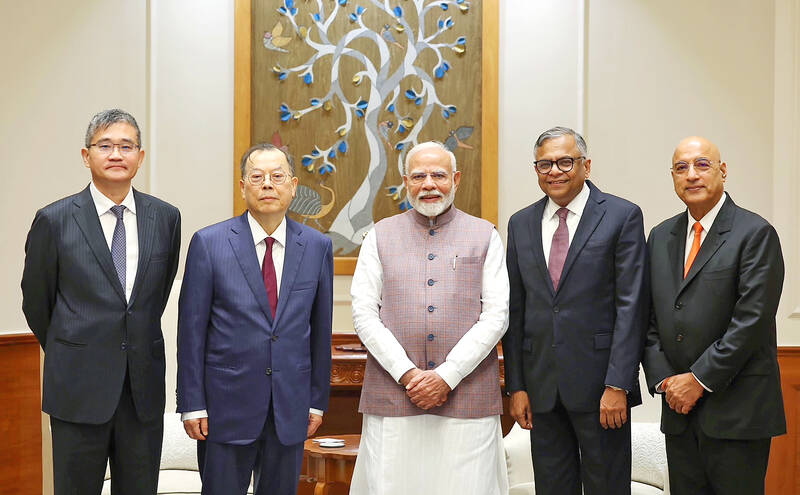Powerchip Semiconductor Manufacturing Corp (力積電) yesterday said that it signed an agreement with Tata Electronics Pvt Ltd to help build India’s first 12-inch chip manufacturing facility with a total investment of US$11 billion.
As part of the agreement, Powerchip would provide Tata with access to mature technology nodes and help to train Indian workers, the Taiwanese company said in a statement.
The fab would be located in Dholera, Gujarat. It would have a capacity of 50,000 wafers per month and create 20,000 jobs in the region, Powerchip said.

Photo courtesy of Powerchip Semiconductor Manufacturing Corp
Tata would receive access to a broad technology portfolio of leading-edge and mature nodes, including 28, 40, 55, 90 and 110-nanometer technologies, as well as collaboration in high-volume manufacturing.
The new fab is to manufacture chips for applications such as power management ICs, display driver ICs, microcontrollers and high-performance computing chips. These products are in high demand in the automotive, computing and data storage, wireless communications and artificial intelligence sectors, it said.
Powerchip told investors in July that any overseas technology partnerships would be based on the condition that they would generate new cash flow and have a positive impact on the company’s financial performance.
The news came after the US and India reached an agreement to work together on setting up a semiconductor fab in India, giving a boost to Indian Prime Minister Narendra Modi’s efforts to increase high-tech manufacturing in the country.
The proposed plant would make infrared, gallium nitride and silicon-carbide semiconductors, the White House said in a statement following a meeting between US President Joe Biden and Modi on Saturday last week.
Earlier this month, Indian Minister of Railways, Communications and Electronics and Information Technology Ashwini Vaishnaw said that the South Asian country is attempting to develop the entire chip value chain as India aims to increase its electronics sector to US$500 billion by the end of the decade.
Additional reporting by Bloomberg

KEEPING UP: The acquisition of a cleanroom in Taiwan would enable Micron to increase production in a market where demand continues to outpace supply, a Micron official said Micron Technology Inc has signed a letter of intent to buy a fabrication site in Taiwan from Powerchip Semiconductor Manufacturing Corp (力積電) for US$1.8 billion to expand its production of memory chips. Micron would take control of the P5 site in Miaoli County’s Tongluo Township (銅鑼) and plans to ramp up DRAM production in phases after the transaction closes in the second quarter, the company said in a statement on Saturday. The acquisition includes an existing 12 inch fab cleanroom of 27,871m2 and would further position Micron to address growing global demand for memory solutions, the company said. Micron expects the transaction to

Vincent Wei led fellow Singaporean farmers around an empty Malaysian plot, laying out plans for a greenhouse and rows of leafy vegetables. What he pitched was not just space for crops, but a lifeline for growers struggling to make ends meet in a city-state with high prices and little vacant land. The future agriculture hub is part of a joint special economic zone launched last year by the two neighbors, expected to cost US$123 million and produce 10,000 tonnes of fresh produce annually. It is attracting Singaporean farmers with promises of cheaper land, labor and energy just over the border.

US actor Matthew McConaughey has filed recordings of his image and voice with US patent authorities to protect them from unauthorized usage by artificial intelligence (AI) platforms, a representative said earlier this week. Several video clips and audio recordings were registered by the commercial arm of the Just Keep Livin’ Foundation, a non-profit created by the Oscar-winning actor and his wife, Camila, according to the US Patent and Trademark Office database. Many artists are increasingly concerned about the uncontrolled use of their image via generative AI since the rollout of ChatGPT and other AI-powered tools. Several US states have adopted

A proposed billionaires’ tax in California has ignited a political uproar in Silicon Valley, with tech titans threatening to leave the state while California Governor Gavin Newsom of the Democratic Party maneuvers to defeat a levy that he fears would lead to an exodus of wealth. A technology mecca, California has more billionaires than any other US state — a few hundred, by some estimates. About half its personal income tax revenue, a financial backbone in the nearly US$350 billion budget, comes from the top 1 percent of earners. A large healthcare union is attempting to place a proposal before